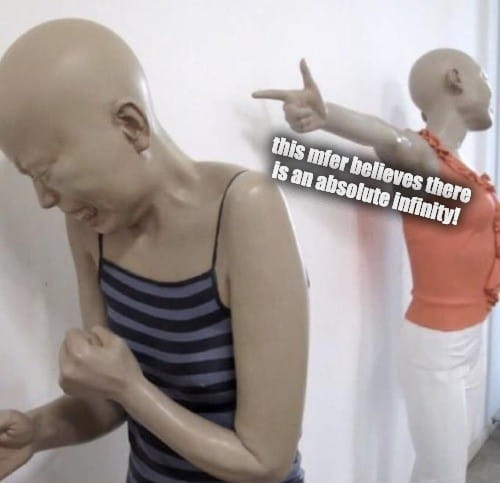this post was submitted on 30 Apr 2024
229 points (93.9% liked)
Science Memes
11426 readers
2890 users here now
Welcome to c/science_memes @ Mander.xyz!
A place for majestic STEMLORD peacocking, as well as memes about the realities of working in a lab.

Rules
- Don't throw mud. Behave like an intellectual and remember the human.
- Keep it rooted (on topic).
- No spam.
- Infographics welcome, get schooled.
This is a science community. We use the Dawkins definition of meme.
Research Committee
Other Mander Communities
Science and Research
Biology and Life Sciences
- !abiogenesis@mander.xyz
- !animal-behavior@mander.xyz
- !anthropology@mander.xyz
- !arachnology@mander.xyz
- !balconygardening@slrpnk.net
- !biodiversity@mander.xyz
- !biology@mander.xyz
- !biophysics@mander.xyz
- !botany@mander.xyz
- !ecology@mander.xyz
- !entomology@mander.xyz
- !fermentation@mander.xyz
- !herpetology@mander.xyz
- !houseplants@mander.xyz
- !medicine@mander.xyz
- !microscopy@mander.xyz
- !mycology@mander.xyz
- !nudibranchs@mander.xyz
- !nutrition@mander.xyz
- !palaeoecology@mander.xyz
- !palaeontology@mander.xyz
- !photosynthesis@mander.xyz
- !plantid@mander.xyz
- !plants@mander.xyz
- !reptiles and amphibians@mander.xyz
Physical Sciences
- !astronomy@mander.xyz
- !chemistry@mander.xyz
- !earthscience@mander.xyz
- !geography@mander.xyz
- !geospatial@mander.xyz
- !nuclear@mander.xyz
- !physics@mander.xyz
- !quantum-computing@mander.xyz
- !spectroscopy@mander.xyz
Humanities and Social Sciences
Practical and Applied Sciences
- !exercise-and sports-science@mander.xyz
- !gardening@mander.xyz
- !self sufficiency@mander.xyz
- !soilscience@slrpnk.net
- !terrariums@mander.xyz
- !timelapse@mander.xyz
Memes
Miscellaneous
founded 2 years ago
MODERATORS
you are viewing a single comment's thread
view the rest of the comments
view the rest of the comments

Explain?
Might be this? https://en.wikipedia.org/wiki/Absolute_Infinite
Or this is about some people thinking infinity is just a really big number, with which you can do calculations like e.g. (these are non-sensical!):
Transfinite algebra is a widely-accepted aspect of mathematics.
↑Statements dreamed up by the totally Deranged
I mean, the Casimir effect was initially derived as the result of two infinite values having a finite difference.
Bonkers
There are different kinds of infinity
"Countably infinite" means an infinitely-large set of numbers that could be generated by infinitely following an algorithm with a finite number of steps. For example, natural (positive whole) numbers are countably infinite because they could be generated by following this simple algorithm:
The set of real numbers, on the other hand, is uncountably infinite because you can have an infinite number of digits after the decimal place. You can't define a finite generation algorithm like the one above simply because any precision you use wouldn't cover the full range. In other words, if you wanted to modify the above algorithm, and chose 0.1 as your starting number, your algorithm would miss 0.01. If you chose to start at 0.01, you would miss 0.001, and so on
That is the way it is often taught but actually both sets are infinite that is have no ends or in other words are not bounded.
The thing that is confusing to understand is that the question how many there are and how much there is diverges at infinity.
Our intuition (as finite beings) is broken here. Both sets are infinite but in one is more than in the other. That does not make one set more infinite than the other. You cannot be more unending than to literally have no end.
This is incorrect. There is not a one-to-one and onto mapping from the natural numbers to the real numbers ergo the sets have a different size. We have defined words to describe this. We can put uncountably many copies of the natural numbers inside of the real numbers so there are arguably infinitely more reals than naturals.
Granted you have to accept the axiom of choice for any of this.
I know. I've studied this extensively. I am specialized in formal logic and by extension set theory. I've worked with and help write actual research papers in this field where this is basic knowledge.
I've never claimed there to be a bijection between the reals and the natural numbers. Please point out what statement I made that is wrong. I would very much like to know.
Also no you do not have to accept choice for this to be true. ZF is perfectly acceptable to study various infinite sets with differing cardinality.
Edit: This is what I mean when I say that our intuition is broken. One set can be larger than the other but both be non-ending that is infinite.
Beeing larger does not mean it is more infinite!
Your use of language is incorrect. But, since you’re clearly the only published expert with any experience in this topic on the internet, it’s really not worth pointing out that we fall on two sides of the standard axiom of choice debate since you already knew that. Have fun!
My use of language could very well be incorrect. I am not a native English speaker anyways. That's no reason to be so condescending.
I was just merely stating my credentials to have a basis of discussion but you do not seem to be interested in that.